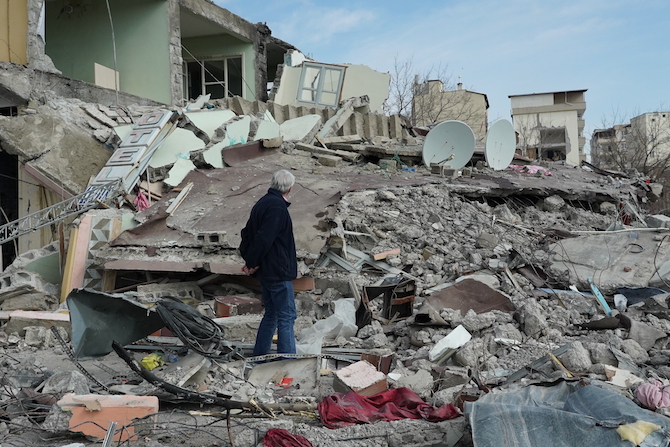by Dilek Türközü

On 6 February 2023, two powerful earthquakes centred in the Turkish city of Kahramanmaraş affected more than 13 million people in 10 provinces of Turkey and many others in the neighbouring country, Syria. The death toll exceeds 50,000 in Turkey and nears 6000 in Syria. A large number of people in both countries have been left homeless.
In Hatay, the most affected Turkish city by the two major earthquakes, a residential building advertised for sale with the caption ‘a frame from paradise’ has painfully turned into a mass grave for its residents. Each person trapped under the rubble had different stories about the past and dreams about the future.
This, was, however, not the first major earthquake in Turkey. The country previously suffered from heavy losses in two other major earthquakes as more than 32,000 people died in the 1935 Erzincan earthquake, and 17,000 people lost their lives in the 1999 Kocaeli earthquake.
Why Did So Many Buildings Collapse in Turkey?
In 10 quake-hit Turkish provinces, the rescue teams often repeat the same question, ‘can anyone hear me?’ while hoping to hear a miraculous voice from a survivor trapped under the rubble. A mirror question arises as to why have the ‘voices of earthquake experts’ and their early warnings been ignored until now?
Turkey’s location on active fault lines may be its geographical destiny. However, a choice is always possible between taking preventive decisions against irreversible damage that an earthquake may cause and ignoring the known risks. The strict implementation of natural disaster management measures may prevent a natural event from turning into a man-made catastrophe or at least reduce the extent of the harm it causes.
Many geoscientists, engineers and other experts commonly stated that the destruction caused by the latest major earthquakes would have been minimised in Turkey if the buildings in high earthquake-risk zones had been constructed in accordance with the building standards set in the Turkish Zoning Law No. 3194, together with the Building Earthquake Regulation. In the aftermath of the earthquake, Turkish authorities also started investigating the building contractors who allegedly used illegal construction methods. A poorly timed investigation, one may say, since the structural integrity of the buildings should have been enforced beforehand according to the law.
Turkey’s Zoning Peace for Construction Violations
Apart from the poor construction practices, the ‘zoning peace’ (also known as zoning amnesty) laws whereby Turkish authorities grant amnesty for construction violations are highly disputed. The reasons are clear: it could weaken the measures for mitigating an earthquake’s possible consequences. Zoning ‘peace’ might turn into a zoning ‘catastrophe’ in the event of a major earthquake. Even if construction violations are forgiven under the law, the human suffering caused by these violations may remain in the memory.
While zoning peace is not a new practice in Turkey, the latest examples deserve attention. Before the presidential and parliamentary elections on 24 June 2018, provisional Article 16 was added on 5 May 2018 to the Turkish Zoning Law No. 3194 for the purpose of introducing a zoning peace for construction violations. Pursuant to this provision, a Building Registration Certificate may be issued for the unlawful structures constructed before 31 December 2017 upon application to the competent authorities and the payment of the registration fee. The structures constructed with more floors and units in violation of the zoning laws may also benefit from zoning peace. Upon the issuance of the certificate, demolition decisions and administrative penalties imposed on account of construction violations shall be cancelled.
The Ministry of Environment and Urbanization of Turkey reported that approximately 10 million people have applied for relief under the zoning peace under provisional Article 16 as of 31 December 2018. The Ministry also extended the zoning peace application deadline upon ‘the intense demand of the citizens’ and in order to avoid any victimisation” As Dr Buğra Gökçe, the Deputy Secretary General of Istanbul Metropolitan Municipality, posted on his social media, more than 3 million unlawful structures were given Building Registration Certificate” in the context of zoning peace, and 294,166 of them were located in 10 quake-hit provinces.
A new zoning peace was already on the agenda during the early campaigns for the presidential elections planned to be held in May 2023. A new draft law for zoning peace for construction violations was proposed on 11 October 2022 by Mustafa Destici, the Leader of the Great Unity Party (Büyük Birlik Partisi, BBP), and it is on pending to be considered by the relevant commission of the Turkish Parliament. Another new draft law for zoning peace was proposed on 4 January 2023 by Çetin Arık, a member of the Turkish Parliament and Republican People’s Party (Cumhuriyet Halk Partisi, CHP), but was withdrawn on the date of proposal.
Given the devastation caused by earthquakes in Turkey, there is no public interest in introducing a new zoning peace law into the legislation. On the contrary, there is a clear public benefit in the rigorous enforcement of the Turkish Zoning Law No. 3194 to combat construction violations and ensure the integrity of the structures.
All Must Step Up to The Plate Before the Tectonic Plates Step Up: ‘Great Istanbul Earthquake’
When the earthquake struck southern and central Turkey on 6 February 2023, the probability of the ‘Great Istanbul Earthquake’ and the extent to which Turkey is prepared for this earthquake came to the fore. The mayor of Istanbul, Ekrem Imamoglu, speaking at Çalar Saat Programme on FOX TV on 15 February 2023, reported that around 317,000 buildings in Istanbul benefited from the zoning peace and around 90,000 buildings under the serious risk of collapse in case of a possible major earthquake in Istanbul. He further stressed that Istanbul is not yet ready for an earthquake, and there is an urgent need to take precautions and not leave it to destiny.
In short, concrete action must be taken before it is too late. The shortcomings in earthquake preparedness process need to be taken into account for the reformative steps. The State organs and municipalities, building contractors, scientists, civil societies and each individual must act in solidarity. Instead of turning a blind eye to the potential risks of natural events, the lessons learnt must be applied to real life.
[To read more on this and everything Middle East, the LSE Middle East Centre Library is now open for browsing and borrowing for LSE students and staff. For more information, please visit the MEC Library page.]






